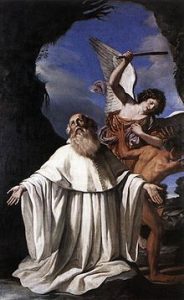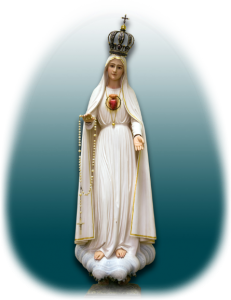 Saint Romuald
Saint Romuald
Feast day February 7
Founder and Abbot (906-1027)
In the tenth century Sergius, a nobleman of Ravenna, quarreled with a relative over an estate and, in a duel to which his son Romuald was witness, slew him. The young man of twenty years was horrified at his father’s crime, and entered a Benedictine monastery at Classe to do a forty days’ penance for him. After some indecision, Romuald became a monk there. San Apollinare had recently been reformed by St. Maieul of Cluny Abbey, but still was not strict enough in its observance to satisfy Romuald. His injudicious correction of the less zealous aroused such enmity against him that he applied for, and was readily granted, permission to retire to Venice, where he placed himself under the direction of a hermit named Marinus and lived a life of extraordinary severity.
The holy man had him recite the Psalter from memory every day. When he stumbled, the hermit struck his left ear with a rod. Romuald suffered with patience, but one day, noting that he was losing his hearing in that ear, asked the old man to strike him on his right ear. This episode supposes great progress in virtue. The two religious were joined by Peter Urseolus Duke of Venice. About 978, Urseolus (Pietro Orseolo I ) obtained his office by acquiescence in the murder of his predecessor, began to suffer remorse for his crime. On the advice of Guarinus, Abbot of San Miguel-de-Cuxa, in Catalonia, and of Marinus and Romuald, he abandoned his office and relations, and fled to Cuxa, where he took the habit of St. Benedict.
In his youth St. Romuald became acquainted with three major schools of western monastic tradition. Sant’Apollinare in Classe was a traditional Benedictine monastery under the influence of the Cluniac reforms. Marinus followed a much harsher, ascetic and solitary lifestyle, which was originally of Irish eremitic origins. The abbot of Saint Miguel de Cuxa, Guarinus, had also begun reforms but mainly built upon a third Christian tradition, that of the Iberian Peninsula. Romuald was able to integrate these different traditions and establish his own monastic order. The admonition in his rule “Empty yourself completely and sit waiting,” places him in relation to the long Christian history of intellectual stillness and interior passivity in meditation also reflected in the nearly contemporary Byzantine ascetic practice known as Hesychasm.
“Sit in your cell as in paradise. Put the whole world behind you and forget it. Watch your thoughts like a good fisherman watching for fish. The path you must follow is in the Psalms — never leave it.”
“If you have just come to the monastery, and in spite of your good will you cannot accomplish what you want, take every opportunity you can to sing the Psalms in your heart and to understand them with your mind. And if your mind wanders as you read, do not give up; hurry back and apply your mind to the words once more.”
During periods of his life, he suffered great spiritual dryness. One day as he was praying Psalm 31 (“I will give you understanding and I will instruct you”), he was given an extraordinary light and spirit which never left him.
His aim was to restore the strict rules of the Order of Saint Benedict, he succeeded in founding around a hundred monasteries in both Italy and France, and he filled the solitudes with hermitages. The principal monastery was that at Camaldoli, a wild, deserted region, where he built a church, surrounded by a number of separate cells for the solitaries who lived under his rule; his disciples were thus called Camaldolese. For five years the fervent founder was tormented by furious attacks by the demon. He repulsed him, saying; “O enemy! Driven out of heaven, you come to the desert? Depart, ugly serpent, already you have what is due you”. And the shamed adversary would leave him. Saint Romuald’s father, Sergius, was moved by the examples of his son, and entered religion near Ravenna; there he, too, was attacked by hell and thought of abandoning his design. Romuald went to visit him; he showed him the error of the devil’s ruses, and his father died in the monastery, in the odor of sanctity.
For 30 years he travelled through Italy, founding and reforming monasteries and hermitages.
In 1012 he arrived at the Diocese of Arezzo. Here, according to the legend, a certain Maldolus, who had seen a vision of monks in white garments ascending into Heaven, gave him some land, afterwards known as the Campus Maldoli, or Camaldoli. St. Romuald built on this land five cells for hermits, which, with the monastery at Fontebuono, built two years later, became the famous mother-house of the Camaldolese Order.
Among his first disciples were Saints Adalbert, and Benedict of Poland, martyrs for the faith. He was an intimate friend of the Emperor Saint Henry, and was reverenced and consulted by many great men of his time. He once past seven years in solitude and total silence. He died, as he had foretold twenty years in advance, alone in his monastery of Val Castro, on the 19th of June, 1027, in an advanced and abundantly fruitful old age.
Many miracles were wrought at his tomb, over which an altar was allowed to be erected in 1032. In 1466 his body was found still incorrupt; it was translated to Fabriano in 1481. In 1595 Clement VIII fixed his feast on 7 Feb., the day of the translation of his relics, and extended its celebration to the whole Church. He is represented in art pointing to a ladder on which are monks ascending to Heaven.
[1]”Saint Romuald.” Sanctoral. N.p., n.d. Web. Feb.-Mar. 2017. <http://sanctoral.com/en/saints/saint_romuald.html>.
[2]Little Pictorial Lives of the Saints, a compilation based on Butler’s Lives of the Saints and other sources by John Gilmary Shea (Benziger Brothers: New York, 1894); Les Petits Bollandistes: Vies des Saints, by Msgr. Paul Guérin (Bloud et Barral: Paris, 1882), Vol. 2
[3]”Romuald.” Wikipedia. Wikimedia Foundation, n.d. Web. 11 Feb. 2017. <https://en.wikipedia.org/wiki/Romuald>.
[4]”St. Romuald.” CATHOLIC ENCYCLOPEDIA: St. Romuald. N.p., n.d. Web. 11 Feb. 2017. <http://www.newadvent.org/cathen/13179b.htm>.
[5]Miller, OFM Fr. Don. “Saint Romuald.” Franciscan Media. N.p., 01 Nov. 2016. Web. 11 Feb. 2017. <https://www.franciscanmedia.org/saint-romuald/>.
 said: Let us make human beings in our image, after our likeness. Let them have dominion over the fish of the sea, the birds of the air, the tame animals, all the wild animals, and all the creatures that crawl on the earth. God created mankind in his image; in the image of God he created them; male and female he created them.God blessed them and God said to them: Be fertile and multiply; fill the earth and subdue it. Have dominion over the fish of the sea, the birds of the air, and all the living things that crawl on the earth.
said: Let us make human beings in our image, after our likeness. Let them have dominion over the fish of the sea, the birds of the air, the tame animals, all the wild animals, and all the creatures that crawl on the earth. God created mankind in his image; in the image of God he created them; male and female he created them.God blessed them and God said to them: Be fertile and multiply; fill the earth and subdue it. Have dominion over the fish of the sea, the birds of the air, and all the living things that crawl on the earth.